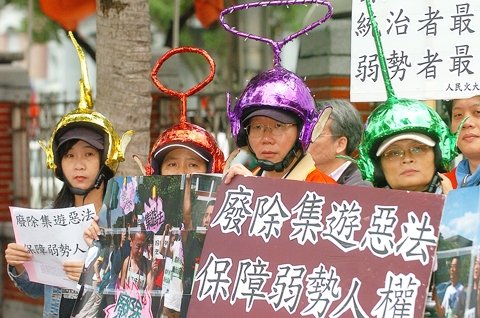Saying that the Assembly and Parade Law (集會遊行法) restricts people more than it protects them, several civic groups demonstrated outside the Legislative Yuan yesterday, demanding that the law be abolished.
“Assembly and parade are ways through which we the people express our voice,” said Wang Ping (王蘋), secretary-general of the Gender/Sexuality Rights Association Taiwan.
“The law, designed to protect our right to hold demonstrations, only tells us that we can’t do this or we can’t do that — how is that a protection?” she asked.

PHOTO: WANG MIN-WEI, TAIPEI TIMES
A demonstration organizer must submit an application for an assembly and parade permit to the local police authority six working days before a demonstration. The organizer must file a separate application for the right to use public spaces in advance and pay a NT$30,000 (US$900) deposit.
However, even if everything is filed in time and conforms to the law, it does not mean that permission would be granted.
The annual gay pride parade in Taipei — held on Sept. 27 — was forced to change its route this year because “no rally or parade can be held in the Boai District [博愛特區] as the national day celebrations were in preparation,” Wang said.
The Boai District is where many central government offices, such as the Presidential Office, are located.
The National Teachers’ Association’s (NTA) application to hold a demonstration in front of the Ministry of Education on Sept. 28 was turned down for the same reason.
“Be they politicians in the green camp or the blue camp, this law is their favorite tool,” NTA spokesman Lo Te-shui (羅德水) said. “The more political a rally is, the easier the permission would be granted. It’s always very difficult for other grassroots campaigners to obtain rally permission.”
“Before he was elected to the presidency, President Ma Ying-jeou [馬英九] and the Chinese Nationalist Party [KMT] voiced their support for amending the law, but now that they’re in control of both the government and the legislature, what has happened to the promise?” Lo asked.
While some of the protesters, such as Green Party Taiwan secretary-general Pan Han-shen (潘翰聲), said they could accept a revised version of the law if the new version actually offers protection of rather than restrictions on the right to assemble and protest, most others insisted that the law should be abolished.
“I don’t want the law to be amended, because however it’s revised, it will still be [the government’s] law — I want it to be abolished,” said Fred Chiu (丘延亮), an associate research fellow at Academia Sinica’s Institute of Ethnology.

Taiwanese can file complaints with the Tourism Administration to report travel agencies if their activities caused termination of a person’s citizenship, Mainland Affairs Council Minister Chiu Chui-cheng (邱垂正) said yesterday, after a podcaster highlighted a case in which a person’s citizenship was canceled for receiving a single-use Chinese passport to enter Russia. The council is aware of incidents in which people who signed up through Chinese travel agencies for tours of Russia were told they could obtain Russian visas and fast-track border clearance, Chiu told reporters on the sidelines of an event in Taipei. However, the travel agencies actually applied

Japanese footwear brand Onitsuka Tiger today issued a public apology and said it has suspended an employee amid allegations that the staff member discriminated against a Vietnamese customer at its Taipei 101 store. Posting on the social media platform Threads yesterday, a user said that an employee at the store said that “those shoes are very expensive” when her friend, who is a migrant worker from Vietnam, asked for assistance. The employee then ignored her until she asked again, to which she replied: "We don't have a size 37." The post had amassed nearly 26,000 likes and 916 comments as of this

US President Donald Trump said "it’s up to" Chinese President Xi Jinping (習近平) what China does on Taiwan, but that he would be "very unhappy" with a change in the "status quo," the New York Times said in an interview published yesterday. Xi "considers it to be a part of China, and that’s up to him what he’s going to be doing," Trump told the newspaper on Wednesday. "But I’ve expressed to him that I would be very unhappy if he did that, and I don’t think he’ll do that," he added. "I hope he doesn’t do that." Trump made the comments in

New measures aimed at making Taiwan more attractive to foreign professionals came into effect this month, the National Development Council said yesterday. Among the changes, international students at Taiwanese universities would be able to work in Taiwan without a work permit in the two years after they graduate, explainer materials provided by the council said. In addition, foreign nationals who graduated from one of the world’s top 200 universities within the past five years can also apply for a two-year open work permit. Previously, those graduates would have needed to apply for a work permit using point-based criteria or have a Taiwanese company